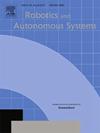利用深度语义分割技术在杂乱树行中实现无 GPS 自主导航
IF 4.3
2区 计算机科学
Q1 AUTOMATION & CONTROL SYSTEMS
引用次数: 0
摘要
最近,基于分段的自主导航技术被认为是一种极具吸引力的方法,它可以引导机器人平台穿过作物行,而无需完美的 GPS 定位。不过,目前的技术仅限于植物与天空之间的明显分隔可以识别作物行中心的情况。然而,高大茂密的植被,如高树行和果园,是 GPS 信号受阻的主要原因。在本研究中,我们通过将基于分割的机器人引导扩展到树冠和树枝遮挡天空并妨碍利用 GPS 和早期方法的情况,提高了控制算法的整体鲁棒性和适应性。我们采用了高效的深度神经网络架构来解决语义分割问题,只使用合成数据进行训练。在模拟和现实世界中,对大量葡萄园和树田进行了广泛测试,以显示该解决方案的竞争优势。该系统在果园中取得了前所未有的成果,平均误差小于每行最大宽度的 9%,通过揭示新的应用场景(如近树冠作物)改进了最先进的算法。正式代码见:https://github.com/PIC4SeR/SegMinNavigation.git。本文章由计算机程序翻译,如有差异,请以英文原文为准。
GPS-free autonomous navigation in cluttered tree rows with deep semantic segmentation
Segmentation-based autonomous navigation has recently been presented as an appealing approach to guiding robotic platforms through crop rows without requiring perfect GPS localization. Nevertheless, current techniques are restricted to situations where the distinct separation between the plants and the sky allows for the identification of the row’s center. However, tall, dense vegetation, such as high tree rows and orchards, is the primary cause of GPS signal blockage. In this study, we increase the overall robustness and adaptability of the control algorithm by extending the segmentation-based robotic guiding to those cases where canopies and branches occlude the sky and prevent the utilization of GPS and earlier approaches. An efficient Deep Neural Network architecture has been used to address semantic segmentation, performing the training with synthetic data only. Numerous vineyards and tree fields have undergone extensive testing in both simulation and real world to show the solution’s competitive benefits. The system achieved unseen results in orchards, with a Mean Average Error smaller than 9% of the maximum width of each row, improving state-of-the-art algorithms by disclosing new scenarios such as close canopy crops. The official code can be found at: https://github.com/PIC4SeR/SegMinNavigation.git.
求助全文
通过发布文献求助,成功后即可免费获取论文全文。
去求助
来源期刊

Robotics and Autonomous Systems
工程技术-机器人学
CiteScore
9.00
自引率
7.00%
发文量
164
审稿时长
4.5 months
期刊介绍:
Robotics and Autonomous Systems will carry articles describing fundamental developments in the field of robotics, with special emphasis on autonomous systems. An important goal of this journal is to extend the state of the art in both symbolic and sensory based robot control and learning in the context of autonomous systems.
Robotics and Autonomous Systems will carry articles on the theoretical, computational and experimental aspects of autonomous systems, or modules of such systems.
 求助内容:
求助内容: 应助结果提醒方式:
应助结果提醒方式:


